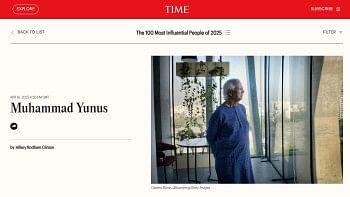Black and white truth
Iremember my United States citizenship interview for a special reason. Not because it was the day I made an important transition in my life. It was something more…. After the initial inquiries on my background, the officer asked me if I had discriminated against anyone because of race, colour or religion. (Since I don't have a written text I am paraphrasing the question) I was taken aback, because I thought it was ironic that anyone would ask me -- brown, Muslim and a woman -- if I held racial or religious prejudices!
On reflection I realised that the question was rooted in the US Constitution -- more specifically, the declaration of independence which states that “all men are created equal, …. with certain unalienable Rights, that among these are Life, Liberty and Happiness.” As the full implication of the question hit me, I felt secure in the belief that the principle of equality was central to my adopted country's ideology and value system. However, the recent killings of two African American men by white policemen, and subsequent grand jury decisions not to indict/punish the offenders have shaken my faith in the fairness of the US system. I have realised that there is a wide chasm between the avowed principles of equality and the practice of these ideals in “real life.”
Police brutality and excessive use of force against African American suspects are not entirely new in the United States. Civil Rights organisations have railed against such injustices for decades. But two recent cases have brought the issue into sharp focus. In August a young, unarmed African American teenager, Michael Brown, was shot and killed, in Ferguson Missouri, by a white police officer. According to eye witnesses Brown had an initial confrontation with officer Darrell Wilson. He then ran and Wilson chased and shot him as he apparently attempted to surrender. Widespread rioting broke out when the State Grand Jury decided not to indict the officer, on grounds of patchy evidence.
Earlier, in July, another African American, Eric Garner, died in New York state after a police officer put him in an apparent chokehold, a tactic banned by the New York Police Department. According to video footage made public, four policemen held Garner down while officer Daniel Pantaleo put his arms around his neck, choking him. Garner was heard repeating “I can't breathe” 11 times. Later, he was pronounced dead, city medical examiners concluding that he was killed by neck compression. Last week, a grand jury decided not to indict Pantaleo, who is white. The decision stirred public protests and rallies, with accusations of police brutality specially targeted against African Americans and a flawed legal system.
The recent incidents have not only exposed deep fissures in the American social milieu but also raised concerns about the robustness of the legal and police administration systems. It would not be inaccurate to infer that these systems reflect people's fears and prejudices that a black person is more likely to commit a crime than a white man. While weighing in on the recent racial slayings, President Obama admitted that “racism was deeply rooted in American society, and it was deeply rooted in the country's history.” His advice was to recognise the civil rights progress to date, and to remain vigilant and keep raising awareness.
Unfortunately, these deeply ingrained racial prejudices among the white population are also manifested in routine, mundane actions, sometimes unconsciously. Recently, a hacked email conversation between Sony Pictures' co-chair and a film producer (both white) revealed their insensitive and condescending attitude toward President Obama. These high-ranking executives mocked the president's taste in movies with a demeaning joke about his preference for films starring black actors. Since Hollywood is hailed as the bastion of liberalism, we can only guess what racial undertones private dinner conversations in many conservative white homes are likely to contain!
The United States should be proud that it elected an African American president and it is also true that, at an intellectual level, most Americans believe that discrimination is wrong. It would be unfair to deny that the country has come a long way from the segregation of blacks in schools and other public places even as recently as the late sixties. However, despite a bloody civil war and a traumatic civil rights movement the US is far from the ideals dictated by its Constitution: “no state shall . . . deny to any person within its jurisdiction the equal protection of the laws.” The arduous and painful journey toward achieving equality still continues. I am optimistic about the resilience of the US to tackle the challenges, as it has done in the past.
However, once in a while I wonder if the brownness of my skin, my South Asian accent and my last name “Ali” make me somewhat vulnerable!
The writer is a renowned Rabindra Sangeet exponent and a former employee of the World Bank.
E-mail: [email protected]

 For all latest news, follow The Daily Star's Google News channel.
For all latest news, follow The Daily Star's Google News channel. 



Comments